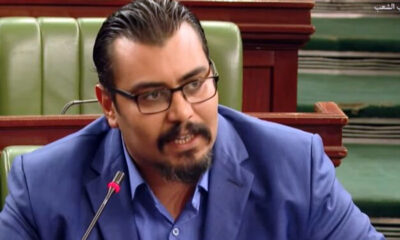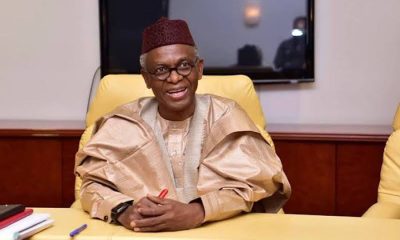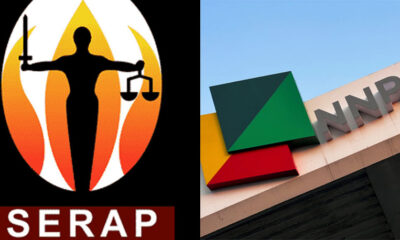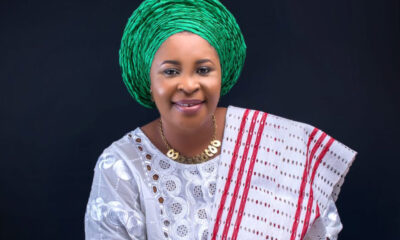News
SERAP sues Akpabio, Abbas over each lawmaker’s N21m running cost

SERAP sues Akpabio, Abbas over each lawmaker’s N21m running cost
Socio-Economic Rights and Accountability Project (SERAP) has filed a lawsuit against the Senate President, Mr Godswill Akpabio, and Speaker of House of Representatives, Mr Tajudeen Abbas.
They are accused of failing “to end the apparently unlawful practice by the National Assembly of fixing its allowances and running costs, and the failure to account for the monthly running costs paid to members.”
The Senate recently came out to denied approving jumbo pay to the federal lawmakers, explaining that N21m considered as monthly salary a lawmaker was actually for running cost.
Akpabio and Abbas are sued for themselves and on behalf of all members of the National Assembly.
Former President Olusegun Obasanjo had alleged that the lawmakers fix their own salaries and allowances, contrary to the recommendations of the Revenue Mobilisation Fiscal Allocation Commission (RMAFC).
In the suit number FHC/ABJ/CS/1289/2024 filed last Friday at the Federal High Court, Abuja, SERAP is seeking: “an order of mandamus to direct and compel Mr Akpabio and Mr Abbas to end the apparently unlawful practice of the National Assembly fixing its remuneration and allowances termed as ‘running cost’.”
SERAP is seeking: “an order of mandamus to direct and compel Mr Akpabio and Mr Abbas to disclose the exact amount of the monthly running costs being paid to and received by the lawmakers, and the spending details of any such running costs.”
SERAP is also seeking: “an order of mandamus to direct and compel Mr Akpabio and Mr Abbas to end the alleged practice of paying remuneration and allowances termed as ‘running costs’ into the personal accounts of lawmakers.”
In the suit, SERAP is arguing that: “The provisions of paragraph N, section 32(d) of the Third Schedule to the Nigerian Constitution 1999 [as amended] clearly make it unlawful for the National Assembly to fix its salaries, allowances and running costs.”
SERAP is also arguing that, “the alleged practice of paying running costs into the personal accounts of lawmakers is a fundamental breach of Rule 713 of the Federal Government Financial Regulations, which provides that ‘public money shall not be paid into a private bank account.’”
READ ALSO:
- VIDEO: China holds colourful reception for Tinubu
- Russia pushes on key Ukraine city while Kyiv’s Kursk incursion slows
- Reactions as singer Timaya accuses apostle Suleman of lying
According to SERAP, “‘Public function’ means activities in the public interest, not against it. The reports that lawmakers are fixing their own salaries, allowances and running costs amount to private self-interest or self-dealing. It is also detrimental to the public interest.”
SERAP said, “The constitutional oath of office of lawmakers requires them to ensure transparency and accountability in the exact amounts of salaries, allowances and running costs they receive.”
SERAP is also arguing that, “The allegations that lawmakers are fixing their own salaries, allowances and running costs are entirely inconsistent and incompatible with the constitutional oath of office and the object and purpose of the UN Convention against Corruption to which Nigeria is a state party.”
The suit filed on behalf of SERAP by its lawyers, Kolawole Oluwadare, Andrew Nwankwo, and Ms Blessing Ogwuche, read in part: “Directing and compelling the lawmakers to account for and return any misused or mismanaged running costs they collected would build trust in democratic institutions and strengthen the rule of law.”
“SERAP is seeking: an order of mandamus to direct and compel Mr Akpabio and Mr Abbas to refer the allegations on the misuse of the running costs received by members to appropriate anticorruption agencies for investigation and prosecution where there is relevant admissible evidence.”
“The country’s international legal obligations especially under the UN Convention against Corruption impose a legal commitment on public officials including lawmakers to discharge a public duty truthfully and faithfully.”
“The convention specifically in paragraph 1 of article 8 requires members to promote integrity, honesty and responsibility in the management of public resources.”
“Nigerians have a right to scrutinize how their lawmakers spend their tax money and the commonwealth. Nigerians also have a right to honest and faithful performance by their public officials including lawmakers.”
“Ending the reported practice by lawmakers of fixing their salaries, allowances and running costs would improve public confidence in the integrity and honesty of the National Assembly.”
READ ALSO:
- Wike threatens PDP govs backing Fubara, says ‘I’ll put fire in your states’
- Napoli in U-turn withdraw Osimhen number 9 jersey from Lukaku
- Double promotion, cash reward for cleaner who returned $10,000 found in aircraft
“Constitutional oath of office requires public officials including lawmakers to abstain from all improper acts, such as fixing their own salaries, allowances and running costs, that are inconsistent with the public trust.”
“It is a travesty and a fundamental breach of their fiduciary duties for members of the National Assembly to fix their own salaries, allowances and running costs.”
“Rule 713 of the Federal Government Financial Regulations provides: ‘Personal money shall in no circumstances be paid into a government bank account, nor shall any public money be paid into a private bank account.’”
“In the Seventh Schedule to the Nigerian Constitution, lawmakers commit to strive to ‘preserve the Fundamental Objectives and Directive Principles of State Policy contained in the Constitution’, [and to] perform their ‘functions honestly, faithfully’, to act ‘always in the interest of the well-being and prosperity of Nigeria’.”
“Lawmakers also commit to ‘preserve, protect and defend the Constitution of Nigeria; and abide by the Code of Conduct contained in the Fifth Schedule to the Constitution.’”
“SERAP notes that Section 15(5) of the Nigerian Constitution requires public institutions to abolish all corrupt practices and abuse of power. Section 16(2) of the Nigerian Constitution further provides that, ‘the material resources of the nation are harnessed and distributed as best as possible to serve the common good.’”
“According to our information, members of the National Assembly are currently fixing their own salaries, allowances and running costs. The running costs are reportedly paid directly into the personal accounts of members.”
“Senator Kawu Sumaila, representing Kano South Senatorial District, recently disclosed in an interview with BBC Hausa that each Nigerian senator earns at least N21 million monthly in running costs, salaries, and allowances.”
“Mr Sumaila reportedly said, ‘My monthly salary is less than N1 million. After deductions, the figure comes down to a little over N600,000. Given the increase effected in the Senate, each senator gets N21 million every month as running cost.’”
No date has been fixed for the hearing of the suit.
SERAP sues Akpabio, Abbas over each lawmaker’s N21m running cost
News
UniAbuja Student Sadiya Usman Found Safe After Two Days Missing

UniAbuja Student Sadiya Usman Found Safe After Two Days Missing
The University of Abuja (UniAbuja) has confirmed that 100-level student Sadiya Usman has been found safe after being reported missing earlier this week. The university expressed relief and gratitude to the public and security agencies for their assistance in locating the student.
Sadiya Usman, who is enrolled in the Department of Accounting, was last seen leaving her residence at Kontagora Estate, Gwagwalada, Abuja, on Tuesday, 18 February 2026, at around 8:00 a.m. She was on her way to the university’s Main Campus to sit for her Computer-Based Test (GST 111) but did not arrive for the exam.
READ ALSO:
- Lassa Fever Deaths in Nigeria Rise to 51 After 15 Killed in Early February – NCDC
- Mob Kills Injured Motorcycle Rider After AK‑47 Rifles, Ammunition Found in Crash Scene
- Tacha Condemns False Rape Allegations After Mirabel Admits Fabrication
After her disappearance, her guardian reported her missing when all attempts to reach her by phone were unsuccessful. The university promptly activated internal safety protocols and collaborated with security agencies, campus authorities, and the public to ensure her safe recovery.
The student was eventually located late on Thursday, 20 February 2026, around 11:49 p.m., and is reported to be safe, unhurt, and in stable condition. Authorities confirmed that coordinated efforts between the university, law enforcement, and concerned members of the public were instrumental in her recovery.
The university reaffirmed its commitment to student safety and welfare, promising continuous updates as necessary. It also thanked those who responded to the public appeal for information and urged students and parents to remain vigilant about safety.
This incident highlights the importance of campus security measures, timely reporting of missing persons, and the role of community involvement in safeguarding students.
UniAbuja Student Sadiya Usman Found Safe After Two Days Missing
News
Police to Arrest TikToker Mirabel After She Recants False Rape Claim

Police to Arrest TikToker Mirabel After She Recants False Rape Claim
The Ogun State Police Command has confirmed plans to arrest and prosecute TikTok user Mirabel after she admitted that her viral rape allegation was false, authorities and investigative reports indicate.
Mirabel, a social media influencer, first sparked national attention after posting videos alleging she had been sexually assaulted in her home in Ogijo, Ogun State. The posts quickly went viral, drawing widespread outrage, calls for justice, and prompting the police to launch an immediate investigation.
An audio recording of a phone conversation, shared online by social media personality VeryDarkMan (VDM), reportedly captures Mirabel acknowledging that parts of her story were fabricated. In the recording, she apologises and admits creating a threatening TikTok account to support her narrative, claiming she had been taking drugs at the time and “was not thinking clearly” when posting the videos.
READ ALSO:
- Again, Early Morning Blaze Destroys Dozens of Shops in Kano Market
- Suspected Terrorists Warn Kebbi Residents: Pay ₦100 Million or Face Attack
- ICPC Searches El-Rufai’s Abuja Home Amid Multi-Agency Corruption Investigation
A police source said senior officers, including the Divisional Police Officer, were at the hospital where Mirabel was receiving medical care. Once she is discharged, she will be taken into custody and formally charged under provisions of Nigeria’s Criminal Code relating to false reporting of sexual offenses. “The essence is to serve as a deterrent to others,” the source added.
The Ogun State Police had earlier ensured that Mirabel received medical treatment and support, following procedures to protect her health while the investigation continued. The Lagos State Domestic and Sexual Violence Agency (DSVA) confirmed that the incident fell outside its jurisdiction and forwarded all relevant information to the Ogun authorities.
This development has sparked public debate about the responsible use of social media, the impact of false allegations, and the importance of evidence-based reporting. Legal experts warn that fabricating sexual assault claims can carry serious criminal penalties and may undermine the credibility of genuine victims.
Authorities continue to urge the public to avoid spreading unverified claims and to cooperate with law enforcement in ongoing investigations. Updates on the case will be issued by the Ogun State Police Command as formal legal proceedings begin.
News
Tinubu Reduces Reliance on U.S, Strengthens Defence Partnerships With Turkey, EU
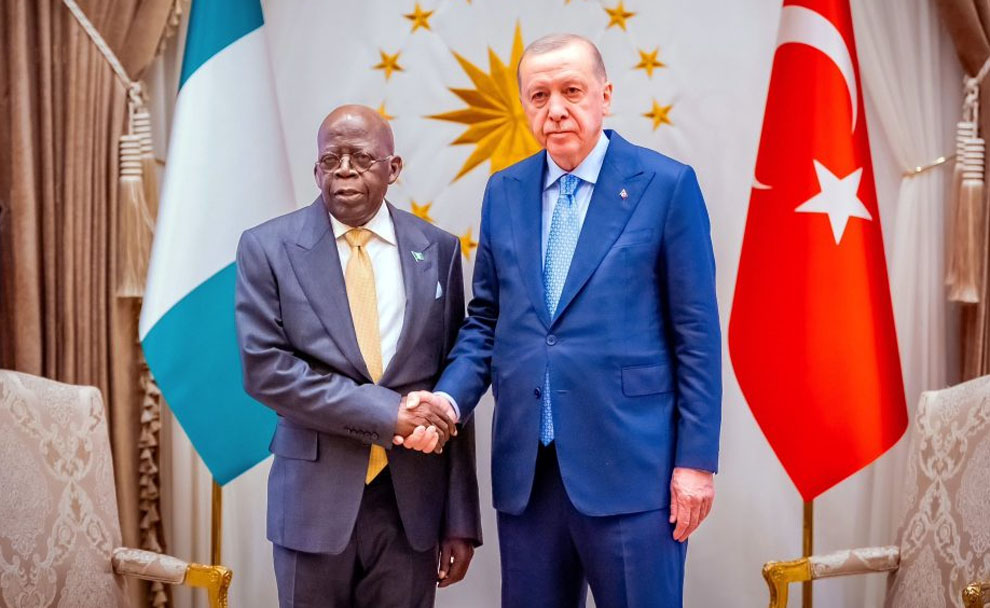
Tinubu Reduces Reliance on U.S, Strengthens Defence Partnerships With Turkey, EU
President Bola Tinubu has commenced a strategic expansion of Nigeria’s defence diplomacy, engaging the European Union (EU) and Turkey to strengthen the nation’s security architecture while reducing overreliance on the United States. The initiative comes as Nigeria faces multiple security threats, including Boko Haram insurgency in the north-east, farmer-herder clashes in the north-central region, separatist violence in the south-east, and escalating banditry in the north-west.
The move coincided with a visit to Brussels by National Security Adviser Mallam Nuhu Ribadu, who led discussions at the first EU-Nigeria Peace, Security, and Defence Dialogue. Both sides agreed to deepen collaboration on regional stability, counter-terrorism, and violent extremism, while enhancing intelligence sharing, maritime security, and cybersecurity cooperation. An EU diplomat in Abuja emphasized that the bloc would provide non-lethal military support, while respecting Nigeria’s sovereignty, describing the EU as “more consistent, more reliable, and more coherent than the United States” in delivering security assistance.
READ ALSO:
- Again, Early Morning Blaze Destroys Dozens of Shops in Kano Market
- Suspected Terrorists Warn Kebbi Residents: Pay ₦100 Million or Face Attack
- ICPC Searches El-Rufai’s Abuja Home Amid Multi-Agency Corruption Investigation
During his state visit to Turkey in January 2026, President Tinubu also held defence discussions with Turkish officials. Turkish companies pledged to supply military equipment, advanced systems, and tactical hardware, while exploring joint local production arrangements with Nigeria. Türkiye is currently regarded as a global leader in armed drones, which could bolster Nigeria’s counter-terrorism operations and reconnaissance capabilities.
Despite these new partnerships, Nigeria continues security cooperation with the United States, including deployments by United States Africa Command (AFRICOM) to support training, intelligence sharing, and operational planning. Recent U.S. personnel arrivals in Bauchi State aim to enhance counter-terrorism capacity without taking direct combat roles, operating under Nigerian command structures.
Analysts say Nigeria’s diversified defence diplomacy seeks to reduce dependency on a single partner, while providing access to a wider range of technology transfer, training opportunities, procurement options, and operational expertise. The strategy also reflects a broader trend of African nations balancing traditional defence alliances with emerging strategic partners to better address evolving security threats.
With regional instability and domestic insurgency on the rise, Nigeria’s engagement with Turkey, the EU, and other partners is expected to strengthen the Nigerian Armed Forces, enhance counter-terrorism operations, and secure national and regional stability.
Tinubu Reduces Reliance on U.S, Strengthens Defence Partnerships With Turkey, EU
-

 News3 days ago
News3 days agoRamadan Begins in Nigeria as Sultan Confirms Crescent Sighting
-

 International1 day ago
International1 day agoCanada Opens New Express Entry Draw for Nigerian Workers, Others
-

 metro3 days ago
metro3 days agoSeven Killed in Horrific Crash at Ota Toll Gate
-

 News2 days ago
News2 days agoKorope Drivers Shut Down Lekki–Epe Expressway Over Lagos Ban (Video)
-

 Health2 days ago
Health2 days agoRamadan Health Tips: Six Ways to Stay Hydrated While Fasting
-

 News11 hours ago
News11 hours agoPolice to Arrest TikToker Mirabel After She Recants False Rape Claim
-

 metro1 day ago
metro1 day agoOsun Awards 55.6km Iwo–Osogbo–Ibadan Road Project to Three Contractors
-

 Entertainment2 days ago
Entertainment2 days agoActress Destiny Etiko Breaks Silence on Alleged Nollywood Betrayal



